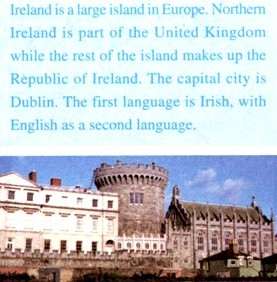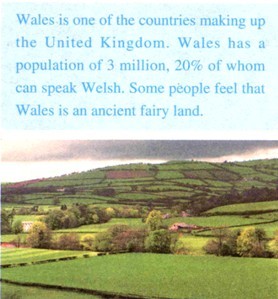人教高中英语高二上UNIT5-1
搜索关注在线英语听力室公众号:tingroom,领取免费英语资料大礼包。
(单词翻译)
The idea that England stands for Fish & Chips, Speakers' Comer, Big Ben and the Tower of London is past. Though many people around the world study its language, their view of British culture is sometimes narrow. The fact that Great Britain is made up of three countries is still unknown to many. Within Great Britain for many years now, there has been a growing movement to make the most of its cultural diversity -- to see it as it really is: a nation of different countries held together by a common language and culture.
The British Isles2 are a group of islands that lie off the west coast of Europe. The largest island is called Britain, which is separated from France by the English Channel, which at one point is only 20 miles wide. It forms the mainland3 of Great Britain and consists of three countries: Scotland4 in the north, Wales in the west and England in the south and east. The island just west of Britain is called Ireland. Between Britain and Ireland, in the Irish Sea, lies the small Isle1 of Man. The British Isles are surrounded by the Atlantic Ocean to the west, and the North Sea to the east.
The climate of the British Isles is mild with a lot of rain. In general, Scotland is colder throughout the year, and receives more rain. It rains a lot in England and Wales too, but the temperatures are more pleasant. In the summer months the difference in temperature Between London and the north can be as much as nine degrees! The coldest months are January and February, while the warmest months are July and August.
The culture of the people of the British Isles was influenced by the culture of the people on the European mainland. In the fifth century, people from different parts of northern Europe settled in England, bringing their own culture and language with them. Their languages formed the basis for English. Some of the native population moved to the inland, mountainous parts of the islands, to Ireland, Scotland and Wales, where they continued speaking their own languages.
In 1066 England was conquered5 by the French. For the next few hundred years the upper classes spoke6 French while the common people spoke English. The result of this French influence was that the English language ended up with many French words such as table, animal and age.
The United Kingdom has a long history. England and Scotland are kingdoms. The first two countries forming the Union were England and Wales in 1536. Wales had already been conquered by England in 1283, but it was not until 250 years later that they formed a single state. Scotland joined later in 1707, while the southern part of Ireland was only part of the UK for some time, and is now an independent republic. Only the northern counties7, making up Northern Ireland, are still part of the United Kingdom. The smaller islands, such as the Isle of Man, are neither part of the United Kingdom nor independent. They are ruled by the King of England.
In modern times, people throughout the British Isles speak English. However, there are still people who also speak the older European languages, Welsh and Irish. There are six spoken languages that are considered to be native to the British Isles as well as two local accents. That most of these are now threatened and may disappear is a serious matter to the people in Britain. They realise that it is of great value to record and teach them to the younger generation.
The idea that England stands for Fish & Chips, Speakers' Comer, Big Ben and the Tower of London is past. Though many people around the world study its language, their view of British culture is sometimes narrow. The fact that Great Britain is made up of three countries is still unknown to many. Within Great Britain for many years now, there has been a growing movement to make the most of its cultural diversity -- to see it as it really is: a nation of different countries held together by a common language and culture.
The British Isles are a group of islands that lie off the west coast of Europe. The largest island is called Britain, which is separated from France by the English Channel, which at one point is only 20 miles wide. It forms the mainland of Great Britain and consists of three countries: Scotland in the north, Wales in the west and England in the south and east. The island just west of Britain is called Ireland. Between Britain and Ireland, in the Irish Sea, lies the small Isle of Man. The British Isles are surrounded by the Atlantic Ocean to the west, and the North Sea to the east.
The climate of the British Isles is mild with a lot of rain. In general, Scotland is colder throughout the year, and receives more rain. It rains a lot in England and Wales too, but the temperatures are more pleasant. In the summer months the difference in temperature Between London and the north can be as much as nine degrees! The coldest months are January and February, while the warmest months are July and August.
The culture of the people of the British Isles was influenced by the culture of the people on the European mainland. In the fifth century, people from different parts of northern Europe settled in England, bringing their own culture and language with them. Their languages formed the basis for English. Some of the native population moved to the inland, mountainous parts of the islands, to Ireland, Scotland and Wales, where they continued speaking their own languages.
In 1066 England was conquered by the French. For the next few hundred years the upper classes spoke French while the common people spoke English. The result of this French influence was that the English language ended up with many French words such as table, animal and age.
The United Kingdom has a long history. England and Scotland are kingdoms. The first two countries forming the Union were England and Wales in 1536. Wales had already been conquered by England in 1283, but it was not until 250 years later that they formed a single state. Scotland joined later in 1707, while the southern part of Ireland was only part of the UK for some time, and is now an independent republic. Only the northern counties, making up Northern Ireland, are still part of the United Kingdom. The smaller islands, such as the Isle of Man, are neither part of the United Kingdom nor independent. They are ruled by the King of England.
In modern times, people throughout the British Isles speak English. However, there are still people who also speak the older European languages, Welsh and Irish. There are six spoken languages that are considered to be native to the British Isles as well as two local accents. That most of these are now threatened and may disappear is a serious matter to the people in Britain. They realise that it is of great value to record and teach them to the younger generation.






